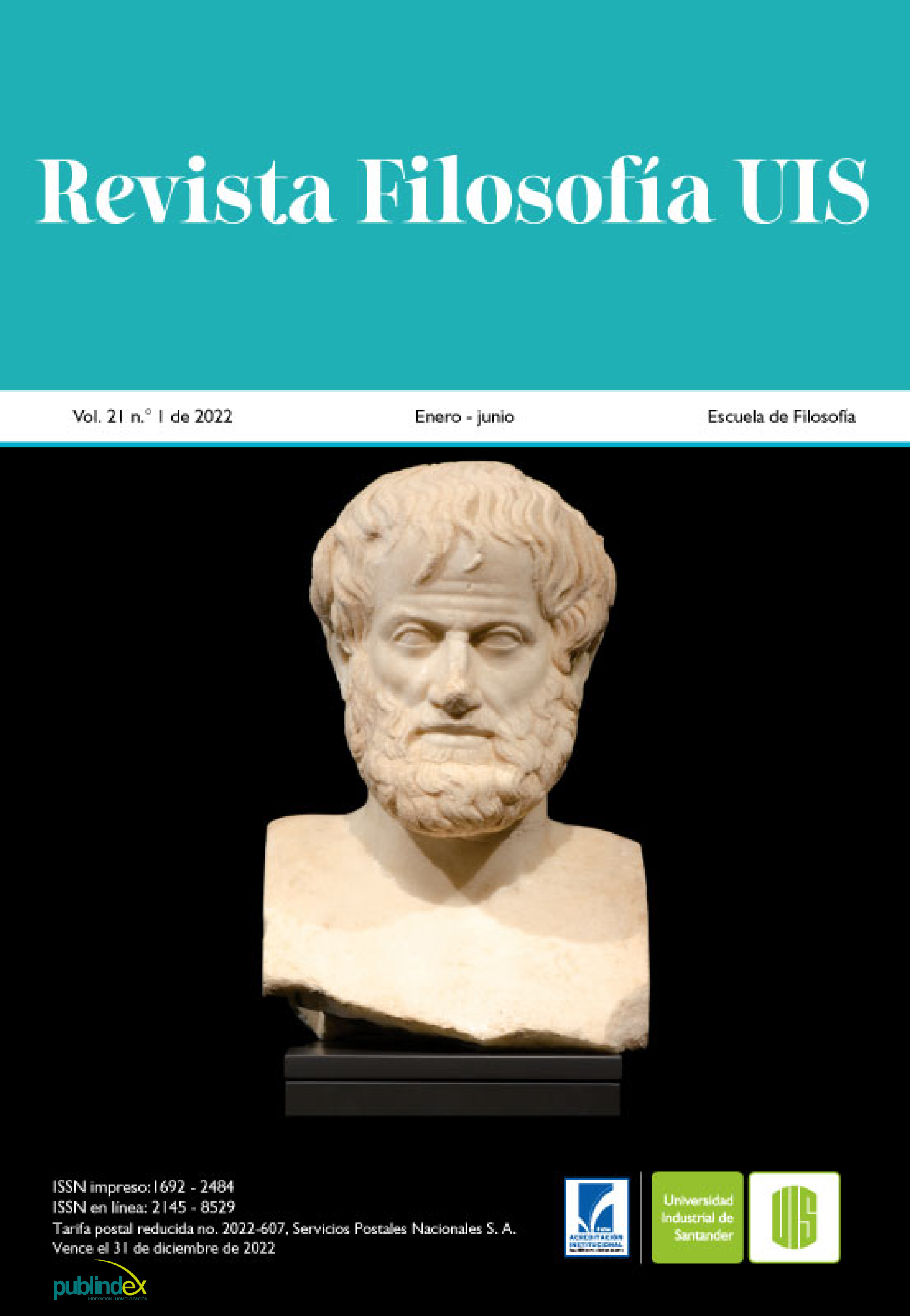Care of the Self as a Practice of Resistance in Mental Health
Published 2022-01-03
Keywords
- care of the self,
- autonomy,
- mental health,
- critical discourse analysis,
- life story interview
How to Cite
Copyright (c) 2022 Revista Filosofía UIS

This work is licensed under a Creative Commons Attribution 4.0 International License.
Abstract
when it comes to mental health, the medicalization of our everyday lives can diminish the autonomy that we hold over our health and care. Considering medicalization as an artefact through which power is exerted via biopolitics it is, however, possible to establish practices of resistance against it. Taking as starting point the testimonies of nine participants considered to be mentally ill, we reflect the relationship between subject and health-care system established through the care of the self as a practice of resistance when it comes to mental health.
Downloads
References
- Angell, M. (2004). Excess in the Pharmaceutical Industry. CMAJ, 171(12), 1451- 1453. https://doi.org/10.1503/cmaj.1041594
- Atkinson, R. (1998). The Life Story Interview. Sage Publications.
- Atkinson, R. (2002). The Life Story Interview. In J. F. Gubrium and J. A. Holstein (Eds.). Handbook of Interview Research. Context and Method (pp. 121-140). Sage Publications.
- Banister, P., Burman E., Parker, I., Taylor, M. & Tindall, C. (2004). Métodos cualitativos en Psicología: Una guía para la investigación. La Noche Editores.
- Berardi, F. (2003). La fábrica de la infelicidad: Nuevas formas de trabajo y movimiento global. Traficantes de Sueños.
- Conrad, P. (1992). Medicalization and Social Control. Annual Review of Sociology, 18, 209-232. https://doi.org/10.1146/annurev.so.18.080192.001233
- Correa de Jesús, N. (1999). Genealogies of the Self in Virtual-Geographical Reality. In A. Gordo-López & I. Parker (Eds.). Cyberpsychology (pp. 77-91). Palgrave McMillan.
- Deleuze, G. (1995). La inmanencia: una vida… In G. Giorgi & F. Rodríguez (Comps.). Ensayos sobre biopolítica. Excesos de vida (pp. 35-40). Paidós.
- De Vos, J. (2017). No hay futuro sin crítica de la psicología: una interrogación del marxismo al psicoanálisis. Teoría y Crítica de la Psicología, 9, 16-35. https://www.teocripsi.com/ojs/index.php/TCP/article/view/207
- Duarte, L. E. (2012). La resistencia en Foucault. Algunas relaciones en torno al 15- M. Revista Filosofía UIS, 11(2), 97-122. https://revistas.uis.edu.co/index.php/revistafilosofiauis/article/view/3366
- Fairclough, N. (1995). Critical Discourse Analysis: The Critical Study of Language. Longman Publishing.
- Feito, L. (2005). Los cuidados en la ética del siglo XXI. Enfermería clínica, 15(3), 167-174.
- Foucault, M. (1988). Madness and Civilization. Vintage Books.
- Foucault, M. (1999). La ética del cuidado de sí como práctica de libertad. In A, Gabilondo (Trans.). Estética, ética y hermenéutica. Obras esenciales, Volumen III (pp. 393-416). Paidós.
- Foucault, M. (2005). The hermeneutics of the subject. Palgrave Macmillan.
- Foucault, M. (2007). El nacimiento de la biopolítica. Fondo de Cultura Económica.
- Foucault, M. (2008). The Birth of Biopolitics. Palgrave Macmillan.
- Foucault, M. (2019). Un diálogo sobre el poder y otras conversaciones. Alianza Editorial.
- Frances, A. (2014). ¿Somos todos enfermos mentales? Manifiesto contra los abusos de la Psiquiatría. Ariel.
- Hancock, B. H. (2018). Michel Foucault and the problematic of power: Theorizing DTCA and medicalized subjectivity. The Journal of Medicine and Philosophy, 43(4), 439-468. https://doi.org/10.1093/jmp/jhy010
- Henares, J., Ruiz-Pérez, I. & Sordo, L. (2020). Salud mental en España y diferencias por sexo y por comunidades autónomas. Gaceta Sanitaria, 34(2), 114-119. https://doi.org/10.1016/j.gaceta.2019.03.002
- Illich, I. (1975). Némesis médica: la expropiación de la salud. Barral Editores.
- Kishore, J. (2002). A dictionary of public health. Century Publications.
- Macías, J. M. (2013). ¿Qué es una formación socrática? Paideia, parresía y buen uso de la razón. Revista Filosofía UIS, 12(1), 85-97. https://revistas.uis.edu.co/index.php/revistafilosofiauis/article/view/3514
- Marwick, A. (2013). Ethnographic and qualitative research on twitter. In K. Weller, A. Bruns, J. Burgess, M. Mahrt & C. Puschmann (Eds.). Twitter and Society (pp. 109-122). Peter Lang.
- Mol, A. (2008). Thelogic of Care: Health and the Problem of Patient Choice. Routledge.
- Muñoz, N. E. (2009). Reflexiones sobre el cuidado de sí como categoría de análisis en salud. Salud Colectiva, 5(3), 391-401. https://doi.org/10.18294/sc.2009.242
- Nadesan, M. (2008). Governmentality, Biopower, and Everyday Life. Routledge.
- Negri, A. (2001). El monstruo político. Vida desnuda y potencia. In G. Giorgi & F. Rodríguez (Comps.). Ensayos sobre biopolítica. Excesos de vida (pp. 93-140). Paidós.
- Parker, I. (2002). Critical Discursive Psychology. Palgrave McMillan.
- Pavón-Cuéllar, D. (2012). Nuestra psicología y su indignante complicidad con el sistema: doce motivos de indignación. Teoría y crítica de la psicología, (2), 202-209. http://www.teocripsi.com/ojs/index.php/TCP/article/view/97
- Pujadas, J. J. (1992). El método biográfico: el uso de historias de vida en ciencias sociales. Centro de Investigaciones Sociológicas.
- Ramos, J. (2018). Ética y salud mental. Herder.
- Rose, N. (2012). Políticas de la vida: Biomedicina, poder y subjetividad en el siglo XXI. UNIPE Editorial Universitaria.
- Van Dijk, T. A. (2001). Critical Discourse Analysis. In D. Schiffrin, D. Tannen, & H. E. Hamilton (Eds.). The Handbook of Discourse Analysis (pp. 352-371). Blackwell Publishers.

